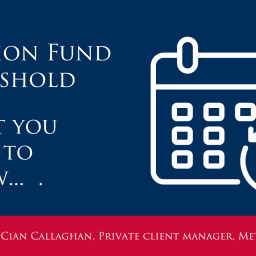
Can You Retire Early in Ireland? The million dollar question! Early retirement is a dream for many, but in Ireland, that dream can be especially challenging to achieve.
Between high income taxes, capital gains tax on business sales, and hefty tax rates on investment growth, early retirement can feel out of reach. Add in the high cost of property and soaring rents, and it’s no surprise that many people question whether early retirement in Ireland is realistic.
Yet, with smart financial planning, disciplined saving, and a strategic investment approach, retiring early in Ireland is possible. Let’s explore what it takes to get there and how you can take control of your financial future.
Step 1 Build a Financial Plan That Reflects Your Goals
Every successful early retirement starts with a comprehensive financial plan. This plan should include:
- Your current financial position
- Projected income and expenses
- Expected tax liabilities
- Long-term lifestyle goals
- But more than the numbers, a great plan reflects your values. Do you want to retire completely, or just gain the financial independence to choose how you spend your time?
A Certified financial planner in Ireland can help you create a tailored roadmap that adapts over time and takes advantage of opportunities to reduce your tax burden.
Step 2 – Calculate Your Retirement Number
How much do you need to retire early in Ireland? A helpful guideline is the “Rule of 300”: Multiply your expected monthly spending by 300.
- For example, if you need €4,000/month to live comfortably, your target retirement pot should be around €1.2 million.
This is only a starting point. Be sure to factor in:
- Inflation
- Healthcare costs
- Investment taxes
- Changes in pension legislation
Step 3 – Maximise Returns, Minimise Tax
To retire early in Ireland, your investments need to work harder than most. That means:
- Maximising returns through global diversification and long-term growth assets
- Minimising tax via tax-efficient wrappers like PRSAs
Remember, investment income and gains in Ireland are heavily taxed unless carefully managed. Make sure your financial plan accounts for these implications, especially over a 30+ year retirement horizon.
Step 4 – Balance Lifestyle and Savings
Yes, you’ll need to save aggressively to retire early, but that doesn’t mean living a life of denial. In fact, many people who retire early focus on intentional spending, which means:
- Prioritising spending on what truly matters
- Avoiding lifestyle creep as income rises
- Choosing quality over quantity
By being mindful about where your money goes, you may be surprised at how much you can set aside, even in Ireland’s high-cost environment.
Step 5 – Explore Alternative Income in Early Retirement
Early retirement doesn’t have to mean zero income. In fact, many early retirees:
- Start passion projects
- Consult or freelance on their terms
- Generate passive income through investments or rental properties
Even a small income stream can significantly extend the longevity of your retirement funds, especially when paired with a tax-efficient withdrawal strategy.
Is Early Retirement in Ireland Worth It?
Absolutely! but only if you plan well. The reality is that retiring early in Ireland comes with unique financial challenges, but those challenges can be overcome with the right strategy.
By aligning your financial decisions with your values, working with a trusted advisor, and making smart tax and investment choices, you can design a future where work is optional, not necessary.
Ready to Explore Early Retirement in Ireland?
Whether you’re just starting to dream about early retirement or actively planning your exit, we’re here to help. At Metis Ireland, we specialise in financial planning for those who want to live life on their terms.
Call us at 01 908 1500 Or email info@metisireland.ie
Disclaimer
Metis Ireland Financial Planning Ltd t/a Metis Ireland is regulated by the Central Bank of Ireland.
All content provided in these blog posts is intended for information purposes only and should not be interpreted as financial advice. You should always engage the services of a fully qualified financial adviser before entering any financial contract. Metis Ireland Financial Planning Ltd t/a Metis Ireland will not be held responsible for any actions taken as a result of reading these blog posts.







